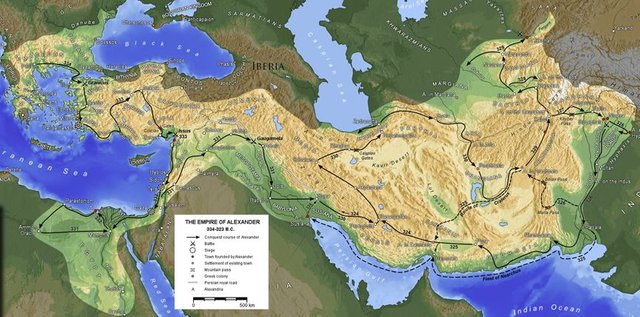After the death of his father, 20-year-old Alexander consolidates his rule. In the spring of 334 BC, he sets off with 40,000 men to attack the great enemy in the east: the Persian king Darius.
After the death of his father, 20-year-old Alexander consolidates his rule, subduing the Greek city-states and disempowering his throne rivals. In the spring of 334 BC, he sets off with 40,000 men to attack the great enemy in the east: the Persian king Darius.
After the violent death of his father King Philip II of Macedonia 336 BC The 20-year-old Alexander is in a dangerous situation. His lawful succession to the throne is far from secure and is questioned by many sides. The Macedonian General Attalos has already commented critically on Alexander's rights at the wedding of his niece Cleopatra with Philip, and so the new king has him murdered without further ado. The same thing happened to Amyntas IV. He had been brought to the throne by Philip and now hoped to be able to enforce his rightful claims. Alexander also executes him, as well as his own stepbrother Karanos and numerous other nobles, whom he considers threatening. His mother and Philipp's main wife, Olympias, are in no way at stake: she publishes a victim of the dead to the murdered murderer of her husband who is on the run and then takes care of the liquidation of Cleopatra and her offspring.
When the next environment is cleared of all potential adversaries and competitors, Alexander is working to secure the supremacy of Macedonia in Greece. The death of Philip had awakened hope among the Greek states to shake off the Macedonian yoke. Alexander can therefore be confirmed oziell in his position with the most important alliance partners, with his military threats above all the opponents of the archipelago Athens and Thebes move to give in.
335 BC Actually Alexander plans to carry out a Persian campaign planned by his father in the spring of 335 AD. However, riots in Thrace and Illyria force his intervention, so he has to postpone his plans. But as soon as he has restored order on the northern border of the Reich, frightening news comes from Thebes: The rumor that Alexander has fallen has led the Thebans to take the lead in a new liberation movement. With Persian money and Athenian weapons, they want to regain freedom from Macedonia.
But the Thebans have miscalculated: Alexander is alive and is a short time later with his army at the gates of the city. Their inhabitants rely on the strength of their fortifications, but in the first attack, the Macedonians succeed in invading the city and overwhelming the defenders. In order for Thebes not to become the martyr of a Greek freedom movement, Alexander takes a psychological move: he sets the punishment for the breach of contract by the other members of the Corinthian Federation. Their decision: The Thebans are enslaved and the walls of the city are looted. After this example, Alexander's position of power in Greece is undisputed. Now he can finally devote himself to the deferred Persian campaign.

